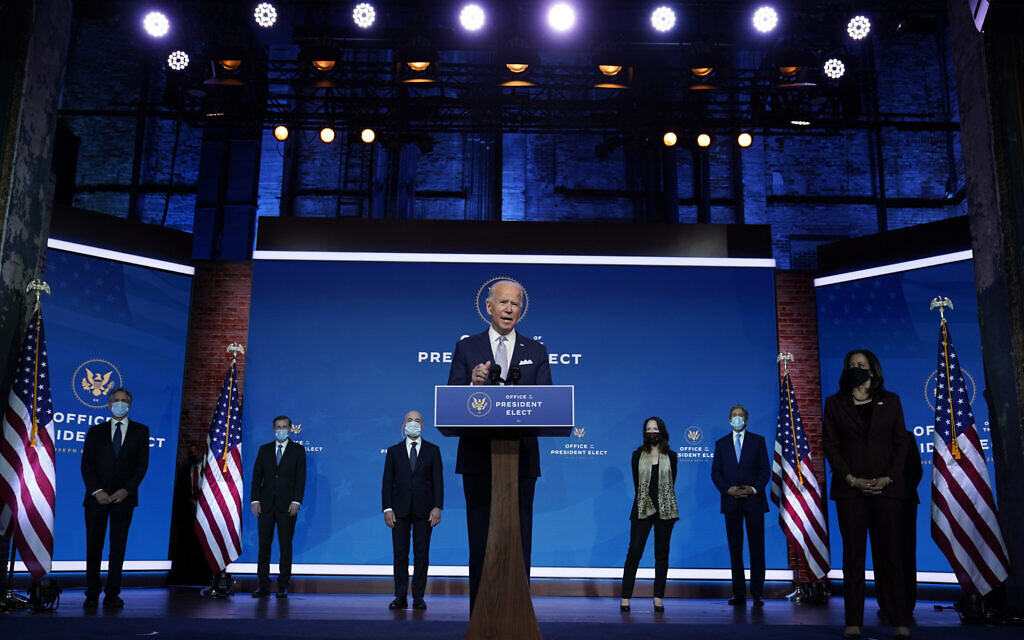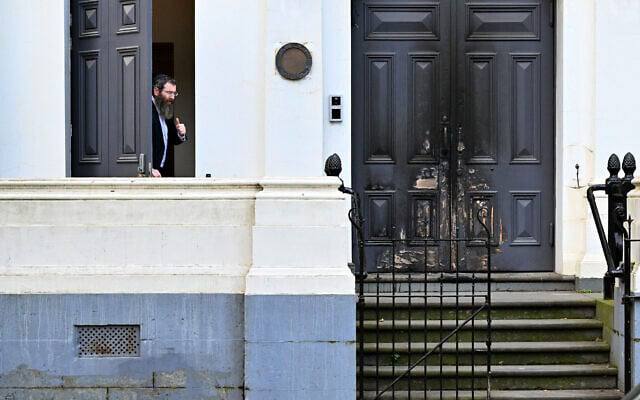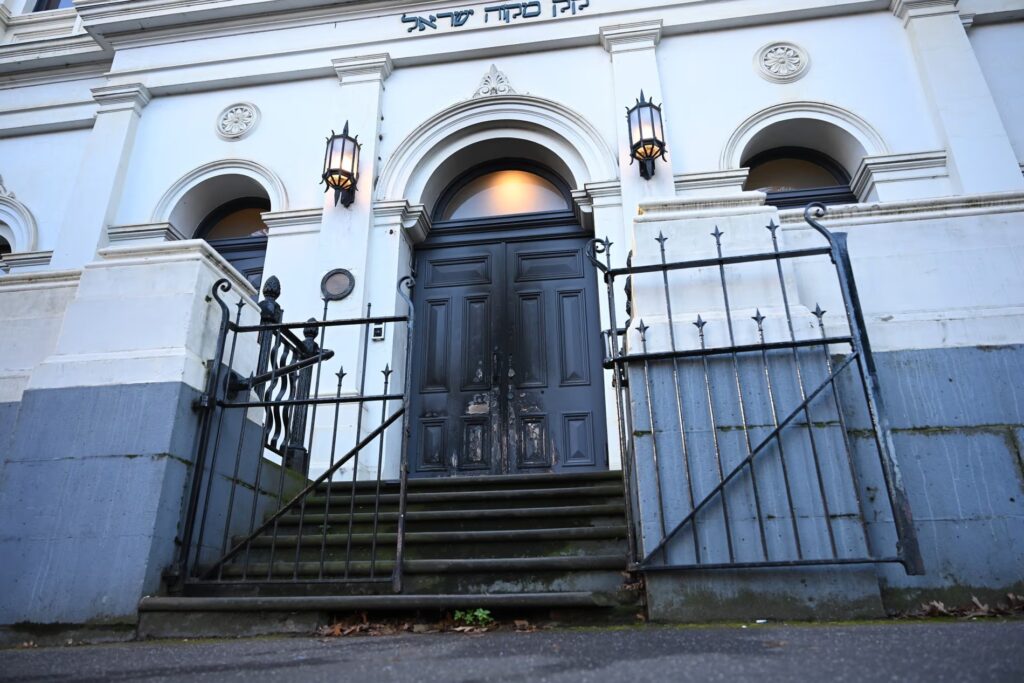UPDATES
The Biden team/ Israeli-Saudi ties
November 27, 2020 | AIJAC staff

Update from AIJAC
11/20 #05
Earlier this week, US President-elect Joe Biden announced six key nominees to his foreign policy/national security team, including Secretary of State, National Security Advisor and Homeland Security Secretary. This Update looks at these nominations and their possible policy implications for the Middle East.
In addition, last Sunday, Israeli PM Binyamin Netanyahu reportedly secretly flew to Neum in Saudi Arabia to meet with Saudi Crown Prince Mohammed bin Salman and US Secretary of State Mike Pompeo. This Update also offers some analysis of the implications of that summit.
We lead with profiles of the six key Biden nominees from Jacob Magid of the Times of Israel. He notes the Jewish background of Secretary of State nominee Tony Blinken, and Homeland Security Secretary nominee Alejandro Mayorkas, and looks at the history on Middle East policy of all nominees, including also the newly nominated United Nations envoy Linda Thomas-Greenfield, National Security Advisor pick Jake Sullivan and Director of National Intelligence nominee Avril Haines. Most have histories of involvement with the Middle East policies of the Obama administration, which Magid discusses. For all the details, CLICK HERE. In addition, here are some more detailed profiles on the Jewish backgrounds of Blinken and Mayorkas.
Next up is a piece from the Jewish News Syndicate consisting of interviews with two Israeli academic experts on the implications for Israel of these appointments. Efraim Inbar, head of the Jerusalem Institute for Strategy and Security, and Eytan Gilboa of Bar Ilan University’s BESA Centre for Strategic Studies suggest that nominees like Blinken and Sullivan are very experienced and have a record of working together well. Inbar and Gilboa each raise some concerns about the possible policies of this team towards both Iran and international institutions like the UN, based on their performance during the Obama years, and suggest these may have implications for Israel. For their analysis, CLICK HERE.
Finally, we offer a discussion of what is behind the Netanyahu-Mohammed bin Salman meeting by Washington Institue for Near East Studies expert Simon Henderson. He says the key explanation for the meeting and especially the timing of it is mutual concerns about Iran and the need to secure existing achievements on that front before the Biden administration takes office. Henderson suggests internal political considerations in both Israel and Saudi Arabia also likely played a role in the timing, but that Saudi-Israeli normalisation has been shifted into the fast lane. For his complete discussion, CLICK HERE.
Readers may also be interested in…
- More on Israeli-Saudi covert ties and the possibility of normalisation from Italian parliamentarian turned analyst Fiamma Nirenstein, and Raphael Ahren from the Times of Israel.
- A report that Israeli experts do not expect full public ties with Saudi Arabia in the near future because King Salman remains opposed.
- A longer analysis of what Saudi Arabia is thinking vis a vis Israel and the Biden administration from former senior US official Richard Goldberg.
- Veteran US academic and commentator Mitchell Bard offers “A Middle East Policy Guide for President-Elect Biden.”
- Yonah Jeremy Bob of the Jerusalem Post predicts that, despite some sabre-rattling, the US will not attack Iran in the final weeks of Trump’s presidency.
- US Iran envoy Elliot Abrams says that during its final months in office, the Trump Administration plans to tighten sanctions on the regime in Teheran and urges the Biden administration to make use of this leverage.
- Khaled Abu Toameh reports how Arabs in the Gulf are demanding an apology from PA President Mahmoud Abbas and the Palestinian leadership over their heavy verbal attacks on the UAE and Bahrain after they normalised relations with Israel.
- Some examples from the many stories and comments now appearing at AIJAC’s daily “Fresh AIR” blog:
- Video of AIJAC’s webinar with Washington thinktanker Mark Dubowitz on the “Biden Administration and the challenge of a rogue Iran.” It includes Dubowitz’s assessment of the new Biden foreign policy nominees.
- AIJAC’s statement on the release of imprisoned Australian academic Dr. Kylie Moore-Gilbert, held in Iran on bogus charges for more than two years. Plus, Naomi Levin looks at the three convicted Iranian terrorists apparently released by Thailand to secure Moore-Gilbert’s freedom.
- Oved Lobel in The Strategist on the Armenia-Azerbaijan conflict and Turkey–Israel tensions. Plus, a blog he did on Iran and the Armenia-Azerbaijan conflict.
- Judy Maynard documents how, at a time of global pandemic, the World Health Organisation’s General Assembly last week wasted time and resources on politicised condemnations of Israel.
7 things to know about Biden’s latest senior appointments
US president-elect’s nominees include pair of ‘2nd-generation survivors,’ an Iran deal and Gaza ceasefire negotiator, and 2 women trailblazers in diplomacy and national security
By JACOB MAGID
Times of Israel, 25 November 2020
NEW YORK — US President-elect Joe Biden on Tuesday introduced his nominees for key members of his national security and foreign policy team, declaring that “America is back, ready to lead the world.”
“These public servants will restore America’s global leadership and moral leadership,” Biden said as the six men and women stood behind him wearing face masks.
Here’s what you need to know about the group of appointees who, if confirmed, will enter their posts with a wealth of experience, even while checking many “firsts” boxes.

US President-elect Joe Biden’s nominee for secretary of state, Tony Blinken, speaks at The Queen theatre, November 24, 2020, in Wilmington, Delaware. (AP Photo/Carolyn Kaster)
1. Secretary of State nominee Blinken is a ‘mensch’ who wants to build on the Abraham Accords
Former colleagues of Tony Blinken who spoke with The Times of Israel could not have been more effusive in their praise for the longtime diplomat. Ex-White House Middle East envoy Dennis Ross highlighted the “intellectual honesty to him, in that he doesn’t keep a position if he realizes after the fact that it is not the right one.”
In an interview with The Times of Israel last month, Blinken said he supports the Abraham Accords brokered by the Trump administration between Israel, the United Arab Emirates and Bahrain. He expressed hope that as more countries normalize relations with Israel, Jerusalem will feel more secure and more willing to advance the peace process with the Palestinians as well.
“He’s a mensch above all else,” said Conference of Presidents of Major American Jewish Organizations executive vice president Malcolm Hoenlein.
Blinken also has a lighter side, which includes a ’70s-inspired band cleverly called Ablinken that has two tracks on Spotify.
For more on the secretary of state nominee, see The Times of Israel’s profile of him.

US President-elect Joe Biden’s national security adviser nominee Jake Sullivan speaks at The Queen theatre, November 24, 2020, in Wilmington, Delaware. (AP/Carolyn Kaster).
2. National security adviser pick Sullivan brokers ceasefires and nuclear accords
At 43, Jake Sullivan will be one of the youngest national security advisers in decades, yet he brings with him a wealth of experience on the international stage. Sullivan served as national security adviser to Biden when he was vice president. Before that, he was a longtime aide to secretary of state Hillary Clinton and was credited for launching the secret talks with Iranian officials in 2012 that laid the groundwork for the nuclear deal. That same year, he played a key role in brokering the ceasefire that ended Operation Pillar of Defense, launched by Israel in response to Hamas rocket fire from Gaza.
Both of those efforts were highlighted by Biden when he introduced Sullivan on Tuesday.
While described by Democratic strategists as an ally of Israel, he, like many in his party, does not appear to be especially enamoured of Prime Minister Benjamin Netanyahu and his policies.
A dump of Clinton’s email correspondences by Wikileaks showed Sullivan mocking as insincere an apology made by Netanyahu after warning in a 2015 election day video that Arabs were “coming out in droves” to vote against him.

President-elect Joe Biden listens as his nominee for U.S. Ambassador to the United Nations, Ambassador Linda Thomas-Greenfield, speaks at The Queen theatre, Tuesday, Nov. 24, 2020, in Wilmington, Del. (AP Photo/Carolyn Kaster)
3. United Nations envoy nominee Thomas-Greenfield was a groundskeeper at Liberia’s embassy… while serving as ambassador
If confirmed by the Senate, Linda Thomas-Greenfield would be neither the first African American, nor the first woman, nor even the first African American woman, to serve as US ambassador to the United Nations. But she’s a groundbreaking diplomat nonetheless. Thomas-Greenfield joined the State Department more than three decades ago, when Black women were even more of a rarity in the US diplomatic corps than they are today.
In her 35 years as a diplomat, she’s held roles such as deputy assistant secretary in the Bureau of Population, Refugees and Migration; US ambassador to Liberia; and more recently, assistant secretary of state for African affairs under former president Barack Obama.
In a 2018 Ted Talk, she revealed how her childhood in the deep south helped shape the diplomat she has become.
“I [grew up] in a segregated town in which the KKK regularly would come on weekends and burn a cross in somebody’s yard,” Thomas-Greenfield said then. “But I had the hopes and dreams of my mother who taught me I could face any challenge in my path by being compassionate and kind.”
n example of that compassion shined through in a story about Thomas-Greenfield shared on Twitter by writer Molly McKew after the nomination was announced on Monday.
“LTG became Ambassador in Liberia when I was working there. Pretty much the first thing she did was walk outside the gates of the embassy compound — startling the Marine guards to no end — and start picking up the trash that lined the road,” McKew wrote.
“She viewed it as her job. She approached everything from a practical perspective — always an American thrilled and honored to be on this adventure, always aware of what she represented and what she carried with her,” she added.
Halie Soifer, a longtime Washington national security aide and current executive director of the National Jewish Democratic Council, told The Times of Israel that working with Thomas-Greenfield left her with the impression that the UN envoy nominee is “eminently qualified.”
Citing Thomas-Greenfield’s decades of diplomatic experience, Soifer asserted that the seasoned diplomat was perfectly suited to serve in the Biden administration, which will be working to reassert the importance of multilateralism as a core tenet of its policy.
Thomas-Greenfield said as much upon being introduced by Biden on Tuesday: “America is back. Multilateralism is back. Diplomacy is back.”
While Thomas-Greenfield’s focus at State rarely extended to matters of Israel policy, Soifer said that the nominee’s familiarity with the African political sphere will be an asset at the UN as far as Israel is concerned, because the Jewish state has long sought the support of the bloc to thwart anti-Israel resolutions.
4. Director of National Intelligence nominee Haines is in line to become the first woman to lead the agency
Avril Haines served as CIA deputy director and deputy national security adviser in the Obama administration, gaining a reputation as a no-nonsense teller of tough truths.
“I picked a professional,” Biden said Tuesday. “A fierce advocate for telling the truth and leveling it with the decision makers… I know because I’ve worked with her for over a decade. Brilliant. Humble. Can talk literature and theoretical physics, fixing cars, flying planes, and running a bookstore cafe, all in a single conversation — because she’s done all of that.”
On Israel, Haines appears to take a more critical approach than others in the incoming Biden administration, signing a letter urging the Democratic Party to update its platform to include explicit opposition to settlement expansion and occupation in addition to language supporting Palestinian rights.
Much of the requests in the letter were rejected by Biden and other traditional pro-Israel members of the party, who sufficed with emphasis of the need for a two-state solution to end the conflict.

US President-elect Joe Biden’s Homeland Security Secretary nominee Alejandro Mayorkas speaks at The Queen theatre, November 24, 2020, in Wilmington, Delaware. (AP Photo/Carolyn Kaster)
5. Mayorkas would not be the first Jew to head the Homeland Security Department, but he’d be the first Latino and immigrant in the post
Like Blinken, Alejandro Mayorkas was raised by a Holocaust survivor, his mother, who escaped Romania and settled in Cuba. The nominee for DHS secretary was born there and fled with his family to America as a refugee when he was a child.
As deputy DHS secretary under Obama, Mayorkas worked closely with Jewish groups and spoke often about the specific threats facing American Jews.
Speaking in 2016 to the annual Washington conference of the Orthodox Union about nonprofit security grants, Mayorkas said, “The need is most acute in the Jewish community because of the ascension of anti-Semitism and hate crimes we see.”
Mayorkas grounded his concern in his background and his upbringing. Among the things that “keep me up at night,” he said at the time, was the threat to “my community,” the Jewish community.
If confirmed, Mayorkas and Blinken would join Treasury Secretary nominee Janet Yellen and Chief of Staff Ron Klain in raising the Tribe representation on the cabinet to four.
6. Kerry may not have brokered Middle East peace, but there’s plenty left in the tank
Former secretary of state John Kerry, tapped as White House special envoy on climate, is the most senior and well-known of the bunch introduced on Tuesday.
Jerusalem and Ramallah saw a lot of Kerry in 2013 and 2014 when he shuttled back and forth between the two cities in a desperate attempt to bring the sides together in an agreement that analysts speculated he wanted more than Israelis and Palestinians.
The Israeli government soured on Kerry rather quickly, with then-defence minister Moshe Ya’alon calling the secretary of state “messianic” and “obsessive” in his efforts.
But it is that passion that may make Kerry the perfect fit to represent the Biden administration in the uphill battle against climate change.
“John Kerry was very passionate about climate change since his days in the Senate. He spoke about it long before others did. I am sure he will bring the same passion to his new role. It will be a case where the person meets the moment,” said Washington Institute for Near East Policy scholar David Makovsky, who worked with Kerry on the Israeli-Palestinian peace negotiations.
“Nobody should underestimate his commitment to see through his goals and his commitment to work with allies,” Makovsky added.
7. A Palestinian-American will be the next deputy legislative director
Along with the new national security team members, the Biden transition team also introduced a pair of deputy legislative directors. Longtime House staffer Shuwanza Goff will be the first Black woman to hold the position and Reema Dodin will be the most senior Palestinian-American woman to ever serve in the executive branch.
A longtime staffer for Illinois Senator Dick Durbin, Dodin has become “a fixture of the Senate, who knows what’s happening in the Senate before most senators do,” Soifer said.
In 2017, Dodin co-authored “Inside Congress: A Guide for Navigating the Politics of the House and Senate Floors in 2017.”
Her parents are Jordanian-Palestinian, but her family traces its roots back to the southern West Bank village of Dura.
Biden’s foreign-policy appointments and what they might mean for Israel
While Middle East analysts say Biden is building a team of people in whom he trusts, can rely on and can work together as a team, a good deal of concern centers on whether U.S. foreign policy will look too much like it did during the Obama administration.
BY ISRAEL KASNETT
JNS.org, November 23, 2020
Former U.S. Vice President and President-elect Joe Biden has announced his choices for some of the key positions in his administration when he takes over in January. Biden’s likely victory has created a wave of murmurs in Israel’s halls of government that he would follow what was seen as Obama’s hostile stance with regard to Israel, and his efforts to create daylight between the U.S. and the Jewish state. The question, therefore, is whether or not these key appointees will work to assuage Israeli fears.

Dr. Efraim Inbar, president of the Jerusalem Institute for Strategy and Security: “As a child of Holocaust survivors, Blinken is ‘sensitive to Israel’s concerns.'”
According to Efraim Inbar, president of the Jerusalem Institute for Strategy and Security, U.S. Secretary of State appointee Tony Blinken “is not a newcomer to the Middle East.”
“This is good news,” said Inbar.
He noted Blinken’s record with regard to the 2015 Iran nuclear deal, or Joint Comprehensive Plan of Action (JCPOA), saying he is “on record” demanding an extension of the sunset clause that determined when international restrictions on Iran’s nuclear program would end—an issue Israel was strongly concerned with as well.
Inbar pointed out that Blinken is the adopted son of Holocaust survivors, and perhaps as a result, is also “sensitive to Israel’s concerns.”
Eytan Gilboa, an expert on American politics and foreign policy, as well as a senior research associate at the BESA Center for Strategic Studies at Bar-Ilan University in Ramat Gan, expressed more concern. He told JNS that while Blinken is an expert on national security, “there are two problems for Israel.”
The first, he said, is that Blinken was involved in the JCPOA negotiations. The second is that he worked as deputy secretary of state together with former U.S. Secretary of State John Kerry on the failed 2014 effort to bring the Palestinians and Israel together at the negotiating table.
Both of those issues are viewed by Israel’s right-wing establishment as having been wrongly handled by the Obama administration and not keen to see a Biden administration revisit them with the same foreign-policy approach.
“The question is whether the lessons of Kerry’s failed efforts will have carried over,” said Gilboa.
He noted that Biden is building a team of people in whom he trusts, can rely on and can work together as a team.
At 43, National Security Advisor appointee Jake Sullivan would become the youngest-ever to fill the key position.
Sullivan is considered an expert in national security; he succeeded Blinken as Biden’s national security adviser. He was also former Secretary of State Hillary Clinton’s chief of staff during Obama’s second administration.
According to Gilboa, Blinken and Sullivan “both have the same ideas and experience.”
Sullivan was involved in the secret talks with Iran, “so this is something to be concerned about,” noted Gilboa.
Michele Flournoy, Biden’s likely appointee for Secretary of Defense, served as under-Secretary of Defense during the Obama years. In the last four years, she worked closely with Blinken.
Thus, Blinken, Sullivan and Flournoy have all worked together in the past on the same issues, a key advantage from Biden’s point of view.
Gilboa said Israel should be concerned with these appointments “since all three were heavily involved in the Iran issue and the failed Palestinian negotiations.”
‘There is a lot of concern in the Middle East’
With regard to Biden’s choice for Ambassador to the United Nations, Linda Thomas-Greenfield, Gilboa noted that since she is a former ambassador to Liberia and assistant secretary of state for Africa, “she is mainly interested in Africa, international organizations and multilateral diplomacy.”

Eytan Gilboa, expert on American politics and foreign policy at the BESA Center for Strategic Studies at Bar-Ilan University: “a lot of concern in the Middle East, especially among the Arab Sunni states about the Biden administration”
“This should also be an issue of concern for Israel,” he added, “because Obama approached multilateral diplomacy and the U.N. organizations as legitimate organizations. He demonstrated this when he returned the United States to the UN Human Rights Council, which is a joke.”
“While [former President] George W. Bush recognized it as being highly politicized, corrupt, ineffective, anti-American by nature, directed by the worst human-rights violators in the world, Obama returned the U.S. to this organization,” said Gilboa.
Gilboa also noted that Blinken is in favor of alliances with like-minded states such as those in Europe.
“Biden has expressed interest in reviving close relations with the European Union, which is bad news for Israel,” said Gilboa. “We know the E.U. We know these countries. They are in favor of concessions to Iran, and they still believe that the Israeli-Palestinian conflict is the major source of all problems in the Middle East.”
Turning to the Gulf states, some of which have warned Biden against returning to the nuclear deal, Gilboa said that “there is a lot of concern in the Middle East, especially among the Arab Sunni states about the Biden administration. Many think it will be some modified version of the Obama administration. We will have to see.”
He pointed out that Israel is now concerned with who Biden will appoint as ambassador to Israel and whether Biden will appoint a special representative for the Palestinians, which would indicate his willingness to go beyond just gestures.
Saudi-Israeli diplomacy progresses amid looming Middle East challenges’
BY SIMON HENDERSON
The Hill, 11/24/20

Saudi Crown Prince Mohammed bin Salman (MBS) and Israeli Prime Minister Binyamin Netanyahu who reportedly held a secret meeting in the Saudi city of Neum last Sunday. (Photo: CNN)
The Middle East will never be quite the same again. The meeting Sunday between Israeli Prime Minister Benjamin Netanyahu and Saudi Crown Prince Mohammad bin Salman (MbS), though initially denied by Riyadh, no doubt happened. It almost certainly wasn’t their first meeting — previous maritime assignations on luxury boats in the Red Sea have been rumoured — but this was the most transparent, logged by several websites that track flights.
The meeting, held in a palace in the growing futuristic Saudi city of Neom in the far northwest of the kingdom, broke new ground in that, reportedly, U.S. Secretary of State Mike Pompeo was also there, making it yet another Middle Eastern accomplishment for the Trump administration, although rather late in the day.
Two questions spring to mind. Why? And why now? It is not as if the Saudi-Israeli intelligence liaison is anything new. It has been going on since at least the 1980s, and probably before. The British used to chaperone “long dinners at the Mandarin Oriental” hotel in London for teams from both sides to discuss what divided them, and what didn’t.
The obvious area of mutual concern, then and now, is Iran, which already threatens both countries in terms of regional troublemaking and missiles, and could have a nuclear weapon capability all too soon. In recent years, MbS, the 35-year-old heir to the Saudi throne, has indicated that he sees Israel as a natural partner for his plans to develop the kingdom and transform its economy from its dependence on oil.
The timing of this latest meeting appears to relate to securing the level of what has been achieved so far, before the arrival of the Biden administration, which appears to have different views on how to deal with Iran and the current marginalization of the Palestinian issue.
Personalities — a.k.a., egos — no doubt play a role as well. Netanyahu is under growing domestic political attack for incompetence in responding to the COVID-19 pandemic, and possible corruption involving allegations of fraud, breach of trust and bribery. Pompeo, perhaps, wants an achievement to help with any potential 2024 political ambitions. MbS may feel constrained by the apparent reluctance of his father, King Salman, to shift from decades of support for the Palestinians to joining the normalization bandwagon regarding Israel, on which the United Arab Emirates, Bahrain and Sudan are riding.

A photo composite for the annual G20 Leaders’ Summit is projected onto Salwa Palace in Diriyah, Saudi Arabia, November 20, 2020. MbS was effectively excluded from the Summit and may have been trying to reassert his relevance.
An additional Saudi domestic ingredient should be considered as well. MbS was effectively excluded from the Saudi-hosted G20 summit, held virtually over the weekend. King Salman presided, although MbS had been the Saudi face of the summit for the last two meetings in Osaka and Buenos Aires. Perhaps his low profile was the only way to get President Recep Tayyip Erdoğan of Turkey to attend. For many Western leaders, MbS may remain too associated with the 2018 murder by Saudi agents of dissident journalist Jamal Khashoggi and the current detention and mistreatment of women activists.
So, having a top-level meeting with Netanyahu and Pompeo may make Saudi Arabia’s crown prince feel that he has written himself back into the script of who is transforming the kingdom, and who isn’t. At this stage, it is not clear whether King Salman knew the meeting would take place. The Saudi foreign minister, who may not have been there himself either, has tweeted a denial of the media reports.
But “plus ça change, plus c’est la même chose,” as the French would say — “The more it changes, the more it’s the same thing.” A reminder of what the Middle East is occurred overnight when a cruise missile launched by Iranian-backed Houthi forces in Yemen reportedly hit an oil facility near the Saudi city of Jeddah. The Saudi-Israeli diplomacy shifts normalization into the fast lane, but much can happen to slow, stop or even reverse it.
Simon Henderson is the Baker Fellow and director of the Bernstein Program on Gulf and Energy Policy at the Washington Institute for Near East Policy. Follow him on Twitter @shendersongulf.
Tags: Israel, Joe Biden, Middle East, Saudi Arabia, United States





